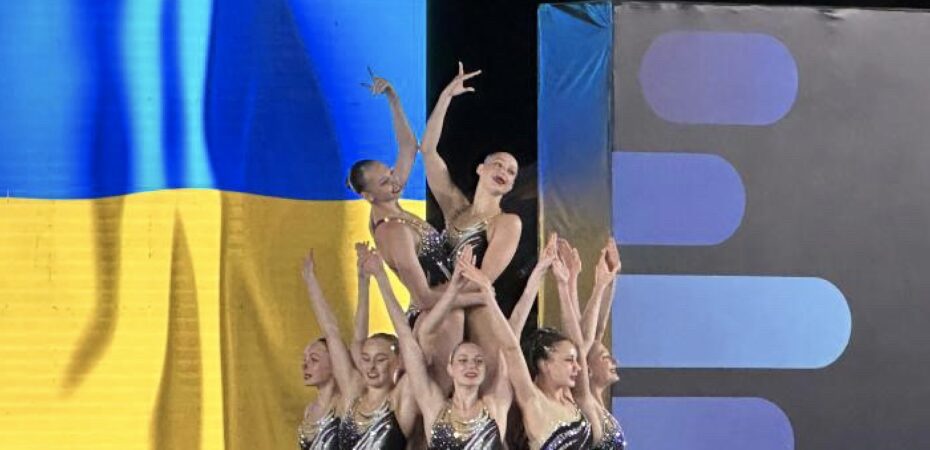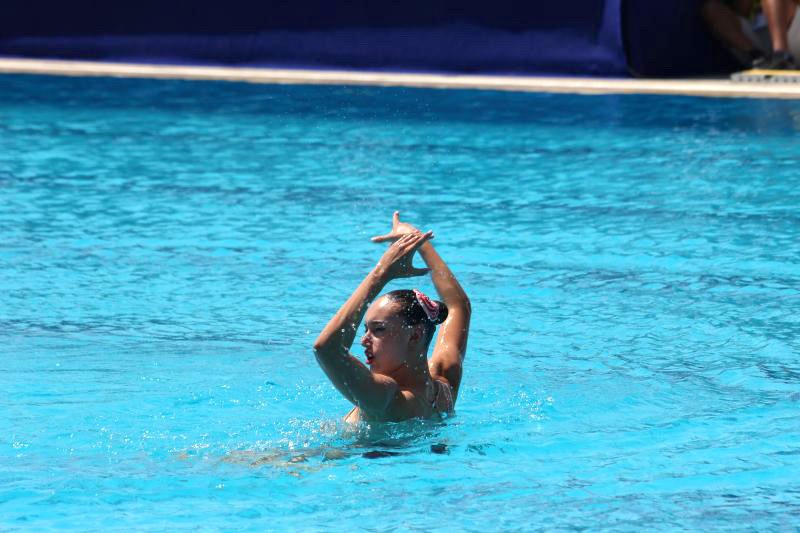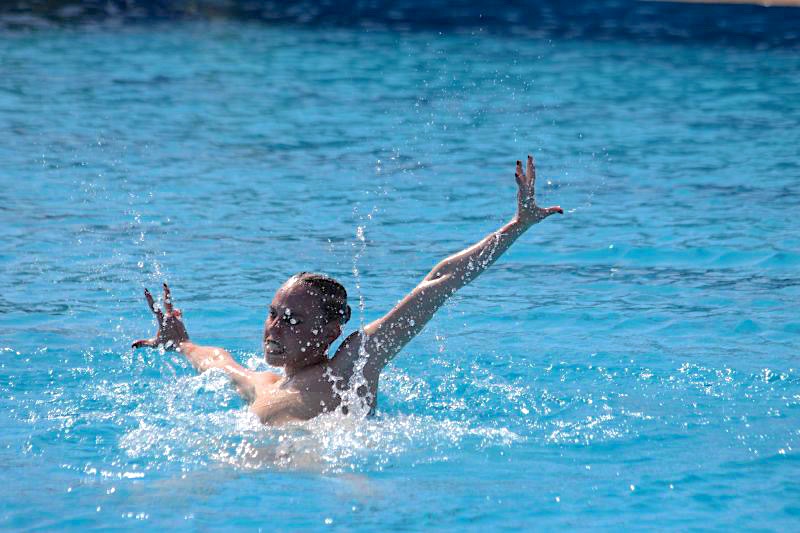The final day of the 2025 Soma Bay World Cup delivered four more medal events, and plenty of unforgettable highlights. Ukraine and Italy clinched their first gold medals of the competition in the acrobatic team and women’s free solo, respectively, while China and Spain added to their title haul in the men’s free solo and free mixed duet.
MEN FREE SOLO
The men’s free solo final opened this last day of the Soma Bay World Cup, and we witnessed an event with no basemarks! A small win, and a fantastic way to kick off the last stretch of competition.
Guo Muye of China picked up his second gold of the competition with a score of 196.7401. The 16-year-old debuted a brand-new routine, set to the theme of “Setting Out on a Campaign,” which was notably choreographed by World Champion Bill May. It was packed with strong technique, precise hybrids, and expressive armwork that connected well with the music.
Swimming first and opening the entire day of competition, Gabriele Minak of Italy took silver with 188.3764. He performed to a theme of “Man or Alien?” and put down the highest Degree of Difficulty (DD) of the final at 48.65. The 18-year-old, reigning national champion in this event, brought power and intensity, especially through his expressions and the demanding choreography.
Rounding out the podium was Colombia’s Gustavo Sanchez, a mainstay in this event and the reigning World bronze medalist. After a disappointing technical solo outing yesterday, he bounced back with his new “The Spirit of Water and Fire” routine that earned him a score of 177.5788. His signature artistic expression and presence were on full display as he earned the bronze, which was also Colombia’s first medal in Soma Bay.
WOMEN FREE SOLO
The women took over next with 23 athletes in the free solo final, where Italy’s two-time Olympian Enrica Piccoli delivered a solid performance to claim the top spot.
Swimming to “La Mamma Morte” by Maria Callas, a dramatic and beloved piece many will recognize from World Champion Virginie Dedieu’s iconic performance in 2007, Piccoli brought technical command and strong execution to win gold with a score of 215.3751.
This swim marked her return to this event on the global stage after several years away. Indeed, Piccoli, the reigning national champion, hadn’t competed a solo internationally since the 2017 European Junior Championships, as she focused on the team routines since her move up to the senior team.
Overall, Italy had a very strong showing in this event, with teammates Valentina Bisi and Ginevra Marchetti finishing fifth and seventh, respectively.
After gold in the technical solo a few days ago, Germany’s Klara Bleyer earned silver with her “Space”-themed routine. She had slightly upped her DD to 51.45 since the Paris World Cup where she had earned gold, and was once again strong and precise throughout.
Unfortunately, a basemark on the final hybrid knocked her score slightly, and it seemed she already knew it the moment she surfaced as she shook her head in frustration. Still, with 208.3589, her overall execution and strong artistic impression kept her comfortably on the podium.
She revealed to the German Aquatics Federation afterwards that she forgot an element in that last hybrid, but admitted she’s still very happy about the medal.
“I’m very pleased that I was able to finish so high despite the base mark,” she said. “I got good feedback from the judges and also the advice that I shouldn’t show it on my face when I forget something. Lesson learned, now we’re on!”
Vasilina Khandoshka of Neutral Athletes A (Belarus) took bronze with a brand-new, and quite fitting, “Mummy”-themed routine. She carried the highest DD of the day (55.00) and was particularly impressive, executing the routine with strength and originality, especially in the opening moments. She did receive a basemark as well on her fourth hybrid, but that didn’t derail her completely, and she held on for bronze with a score of 206.8613.
Just missing the podium was Georgia’s Maria Alavidze, in what feels like a now-too-familiar position. She had significantly boosted her DD since Paris, jumping from 46.50 to 50.10, and delivered a sharp, expressive swim to the theme of “Memories.” She received full credit for her difficulty, to her visible huge relief, but had to wait until the very last swimmer to know her fate. Unfortunately, she couldn’t hold off after Khandoshka’s strong performance, which pushed her down to fourth, just 2.8525 points shy of the podium.
FREE MIXED DUET
Nine mixed duets took the stage in the free mixed final, but once Spain swam, the gold felt inevitable.
Making their international debut as a mixed pair, Iris Tio and Dennis Gonzalez Boneu delivered a showstopper of a routine to Led Zeppelin’s “Babe I’m Gonna Leave You”. The two had already swam together domestically at the 2023 Spanish Winter Nationals for their club of C.N. Kallipolis, but this was their first time on the world stage. And what a first it was.
Honestly, it was one of the best mixed duets we’ve seen in a long time. Or, ever? Because, this is what a mixed duet should look like.
The chemistry in the water between the two athletes was off the charts. The connection, the musicality, and the storytelling all came together in a performance that was not only technically sharp, but absolutely riveting.
The Spaniards had only declared the fifth-highest DD in the field, but it didn’t matter. The choreography of head coach Andrea Fuentes struck that perfect balance, giving both swimmers space to shine while never losing the thread of the partnership, all while seamlessly integrating the required elements.
The routine flew by. It was fluid, powerful, tender, electric. Everything all at once. One artistic impression judge even dropped a 10 in performance. With a massive 273.6421, the pair took gold by a 36-point margin, and hopefully set the standard for every other duet out there.
Thailand’s Kantinan Adisaisiributr and Supitchaya Songpan made history of their own with a silver-medal-winning routine set to “Titanic” and a score of 237.6159. Their artistic impression score was well deserved, and it was fantastic to see a nation outside the usual powerhouses rise to the occasion.
This marks Thailand’s first-ever medal at a major international competition, and on the world stage.
“We are very, very, very proud of our athletes,” head coach Claudia Tapparelli said. “It has been an emotional weekend, seeing all the hard work they are putting in during all the training and in all the routines come to life here, it’s amazing. This silver is the cherry on top of the cake of this weekend. This is the first medal for Thailand, and this whole group is giving a lot of “first time” for their country. I could not ask for a better team.”
Gustavo Sanchez and Emily Minante of Colombia brought non-stop energy to close out the event with their “Salsa from Cali to the World” routine. The two may perhaps have gotten a bit carried away at times, ultimately racking up a few errors, synchronization deductions and two basemarks (one on the opening acro and one on the final hybrid). Still, their great charisma and strong artistic impression kept them in the mix and just ahead of Spain’s second pair to take bronze with 235.1808.
Unfortunately, Italy’s highly anticipated new pair of Filippo Pelati and Lucrezia Ruggiero had to withdraw at the last minute. Pelati had also scratched from the men’s free solo earlier in the day, so we’ll have to wait a bit longer to see this new mixed duet in action.
ACROBATIC TEAM
Finally, the competition wrapped up with a bang in the acrobatic team event. 14 teams took part in this crowd-favorite finale, and it wouldn’t have been a proper conclusion without a bit of last-day drama.
Ukraine claimed gold with a powerful and sharp routine set to the theme of “Geometry of Magic.” This Ukrainian team is fairly renewed compared to last year’s World silver-medal roster, but still delivered at the highest level. The Ukrainians had the DD of the final (22.812), and executed their precise and original acrobatic movements very well, in an event that has become their strength over the years.
Thanks to a standout performance from their featured swimmer Oleksandra Goretska, who was visibly emotional upon realizing they were sitting in first place, the team scored 200.0911 to bring the country its first gold of this World Cup.
Italy debuted a new and fun routine to “Chicago,” choreographed by Ukrainian Olympian Anna Voloshyna. The Italians were visibly enjoying swimming this routine, showcasing great rhythm and a jazzy flair, with Beatrice Andina, a former junior team flyer, leading the acro charge as featured swimmer on this new senior team. This confident performance landed them the silver medal with 187.0263, their third medal on this very successful day for the Italian team overall.
China rounded out the podium with a bronze-winning performance to an “Eagle” theme with a score of 186.8288. This Chinese team was the only mixed team on the podium, though not the only one in the field, as Kazakhstan and Thailand also had mixed entries.
While this squad isn’t the top national team, but rather a blend of senior and junior athletes, it still showcased fantastic technique and execution, and was a testament of the incredible depth of talent in the country. This team is notably coached by Huang Xuechen, China’s most decorated artistic swimmer and seven-time Olympic medalist.
Then there was Spain, set to close out the competition, but of course, the audio gods couldn’t resist one final prank: a speaker blew during their performance. After three days of music issues, it was only appropriate for that to happen on the last routine of the last event.
The Spaniards performed their Olympic routine again, appropriately named “One Shot, One Opportunity”, although tonight turned into two shots. Despite the disruption and a few uncharacteristic mistakes, including two missed acros that would have likely resulted in basemarks, they waited calmly for their score, albeit looking extremely disappointed. And then, word came in that they could go again.
Back in the water almost immediately, they delivered a much sharper performance the second time around. The acros they had missed were cleanly executed, but this time they couldn’t show all the declared positions on the final one, which resulted in a basemark that still held them back from the podium. The team had to settle for a fourth-place finish in the end, but gave a great show of composure, professionalism, and resilience under pressure.
Japan returned to the acrobatic team stage for the first time since the Paris Olympics, reprising its “Alligators” routine. The ongoing progress on the acrobatic moves was very clear, especially in terms of explosiveness and height on the airborne ones, and should be encouraging for the rest of the season. The Japanese team looked confident and strong, with crisp execution, dynamic transitions, and a tremendous performance overall.
The only major hiccup came on the foot-to-foot connection of their third acrobatic, which unfortunately resulted in a basemark. Still, this powerful swim earned them the second-highest artistic impression score of the day, just behind Spain, and a fifth-place finish.
The World Cup circuit now heads to Canada for its third leg, scheduled from May 1-3 in Markham.
ARTICLE BY CHRISTINA MARMET
Photos: Shams Rashad / Fishtail App.
If you’ve enjoyed our coverage, please consider donating to Inside Synchro! Any amount helps us run the site and travel costs to cover meets during the season.



